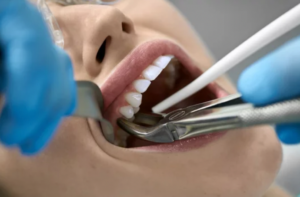Tooth extraction is a common dental procedure performed when a tooth is severely damaged or decayed. If your dentist needs to remove a tooth, it is likely the last option to stop the pain or prevent further infection. Generally, dentists try to avoid extracting teeth if it is possible. However, there are times when it is absolutely necessary.
While the procedure itself is relatively simple, it’s important to take proper care of your mouth in the days and weeks following the extraction to ensure a smooth recovery. Knowing what to expect during recovery can help you heal faster and prepare for any discomfort. Ultimately, this should lead to a smooth and relatively painless recovery.

The 1st 24 Hours
Immediately after the extraction, your dentist will provide you with gauze to bite down on to help stop any bleeding. It’s important to leave the gauze in place for at least 30-45 minutes or until the bleeding stops. After you remove the gauze, you can expect some swelling and discomfort. Fortunately, you should be able to manage this with over-the-counter pain medications and ice packs.
In the first 24 hours after the extraction, it’s important to avoid any strenuous activity, as this can cause increased bleeding and discomfort. You should also avoid smoking or using a straw, as the suction can dislodge the blood clot that forms in the socket. This can lead to a painful condition called a dry socket. Not only is a dry socket extremely painful, but it can significantly increase your risk of infection.
After the 1st Day
In the days following the extraction, it’s important to maintain good oral hygiene to prevent infection. You can brush your teeth as usual, but be gentle around the extraction site. Avoid using mouthwash for the first 24 hours, as the alcohol can irritate the area and delay healing.
After 24 hours, you can use a saltwater rinse to help keep the area clean and reduce inflammation. To make a saltwater rinse, mix one teaspoon of salt with eight ounces of warm water and swish it around in your mouth for 30 seconds before spitting it out.
You should also avoid eating hard, crunchy, or sticky foods for the first few days after the extraction, as these can irritate the extraction site and delay healing. Stick to soft, cool foods like yogurt, mashed potatoes, and smoothies.
Pay Attention
In the weeks following the extraction, it’s important to pay attention to any signs of infection or complications. Although tooth extraction is a traumatic procedure, you shouldn’t feel significant pain or discomfort. If you have extreme pain, you should contact our dentist immediately. It could indicate that you have an infection or complications from the extraction.
Additionally, you should contact our dentist if you have a fever or notice discharge from the extraction site. Unfortunately, this could mean that you have an infection that requires immediate treatment. To learn about our tooth extraction services, see Tooth extraction.

